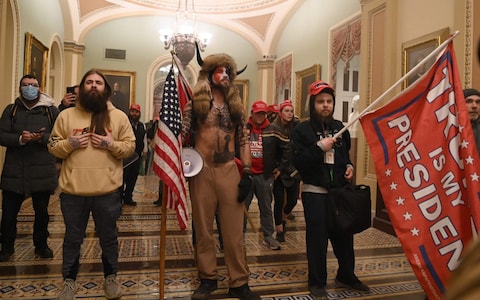Inside the QAnon conspiracy conference where keynote speaker Eric Trump riles up crowds
Sitting in a packed conference hall in Nashville at the weekend, hundreds of people roared in support as the speaker on stage discussed the coming “war” against the “satanic order” controlling the country.
The crowd nodded along in agreement as another speaker claimed powerful elites had orchestrated the pandemic and were plotting to kill people through vaccines.
The three-day conference, entitled “the truth about cancer” would be easy to dismiss as a fringe event, were it not for the fact that it was headlined by the son of a former US president.
Taking to the stage on Saturday night, Eric Trump leaned into the cynicism of the crowd as he claimed Democrats had “weaponised the system” against them.
“Look how all of us have been cancelled,” he told them. “This is how they achieve that power grab, and it’s got to scare all of us”.
This narrative of fear has been co-opted by several disinformation groups now banding together to enter mainstream political discourse.
In what has been called America’s “golden age” for conspiracy theories, the idea that a cabal of global elites is controlling the country is no longer a fringe theory.
Instead, this potpourri of disillusioned and distrustful Americans have found a common community for their bizarre beliefs.
Joining Eric Trump on stage were a range of speakers including Andrew Wakefield, the disgraced British former doctor who co-authored a discredited study claiming a link between vaccines and autism; and Scott McKay, a tomahawk-wielding QAnon conspiracy theorist who claimed powerful elites were “consuming 2.2 million kids every year”.

Andrew Wakefield, the disgraced former British doctor, attended the conference virtually
The three-day event, where tickets cost between $197 and $997, was a broad tent for purveyors of misinformation, with speakers often promoting contradictory conspiracy theories or peddling natural health supplements to treat a range of illnesses.
These seemingly strange bedfellows do have a common theme to rally around, said Jason Reifler, a political scientist who studies conspiracy theories.
“The people that they’re speaking to have large levels of distrust in the system – distrust in expertise, distrust in authorities, distrust in government,” he explained.
“These are the same things that contribute to support for QAnon and opposition to vaccines, or other forms of truther-ism. The core unifying element of that is distrust.”

Enthusiasm for Donald Trump
Analysts say this sharp decline in social trust has benefited Donald Trump, who has continued to fuel the country’s political polarisation ahead of a rumoured 2024 run.
“I think a lot of this is coalition management,” said Adam Enders, an academic at the University of Louisville.
“He used his anti-establishment credentials and the dog whistling to conspiracy theories to wake up these people who hadn’t been active in politics. It’s important to keep these people fired up about things because they’re going to support Trump.”
Leading Republicans have done little to counter the trend. Mitch McConnell, the Republicans’ leader in the Senate, previously called conspiracy theories a “cancer” on his party – but he has said he would “absolutely” support Mr Trump, their most prominent disseminator, in 2024.
Other potential future party leaders have even backed Mr Trump’s disputed claim that the 2020 election was rigged – reflecting the views of many of their base – while more than 30 QAnon adherents are running for Congress in 2022.
“It really has moved from sort of fringe to mainstream. Trying to overthrow a democratically-elected government in the United States would have seemed unthinkable five years ago, but yet it happened [on January 6],” said Prof Reifler.

Trump supporters, including QAnon adherent Jake Angeli, stormed the US Capitol hoping to stop the certification of the election
Credit: Saul Loeb/AFP
The ongoing enthusiasm for Mr Trump was palpable in the crowded conference hall in Nashville’s music valley, where flag-adorned supporters shouted their support for the former president and journalists from the mainstream media were persona non grata.
While conspiracy theories in politics are nothing new, data suggests the US is the only established democracy to undergo such a major decline in social trust.
The decline appears to correlate with the country’s increasing political polarisation, often traced back to the late 1960s and the escalation of the Vietnam War.
According to the American National Election Survey, 56 per cent of Americans believed most people can be trusted in 1968. In 2021, public trust in government has fallen to around 24 per cent, according to the Pew Research Centre.
With partisanship at an all-time high in a divided Congress, some fear these entrenched positions may be heard to reverse.
Joe Biden alluded to the problem last week, when he said that for: “Half the Republicans: I am not your President; Donald Trump is still your President. As we Catholics say: ‘Oh, my God.’”
Disinformation about coronavirus
The coronavirus pandemic has also become a lightning rod for disinformation, with false theories about its origin and fake treatments being spread by everyone from elected officials to uninformed commentators online.
Attitudes towards the pandemic fall sharply along political lines, with around 90 per cent of Democrats vaccinated against Covid-19, compared to just 58 per cent of Republicans.
The pandemic has exposed the virulence of America’s anti-vaccine movement – a demographic bloc that Mr Trump and other Republicans have courted by championing the importance of personal liberty and medical freedom.
It has also “exacerbated” the socio-economic factors that drive such disenfranchisement, said Prof Enders, with stagnant wages and rising inflation increasing America’s economic inequality.
Back in Nashville, the anger over the coronavirus debate was clear to see among conference-goers, many of whom had doubts over the pandemic’s origin and the country’s response.
One attendee proudly showed off what she sarcastically dubbed her “domestic terrorist” T-shirt, which railed against mask and vaccine mandates with the slogan: “We do not co-parent with the Government.”
Another wore a T-shirt which read: “Covid is a hoax”.
While some said they had come to learn more about alternative treatments for cancer, many more said they had come to hear more about claims that vaccines are dangerous.
Keri Young, a 54-year-old homemaker from California, said she had fallen out with family and friends over her refusal to take the Covid-19 vaccine and her concerns about government overreach.
“My kids say ‘mom’s crazy’, but there’s a lot of good information here,” she said.
Another put his position more bluntly. “Big pharma is trying to kill us and they’re making billions of dollars in the process,” said Eric, a construction worker in his 40s, who asked to be referred to by a pseudonym.
Perhaps it was Eric Trump who summed up their position best of all: “We just want to be left alone.”


